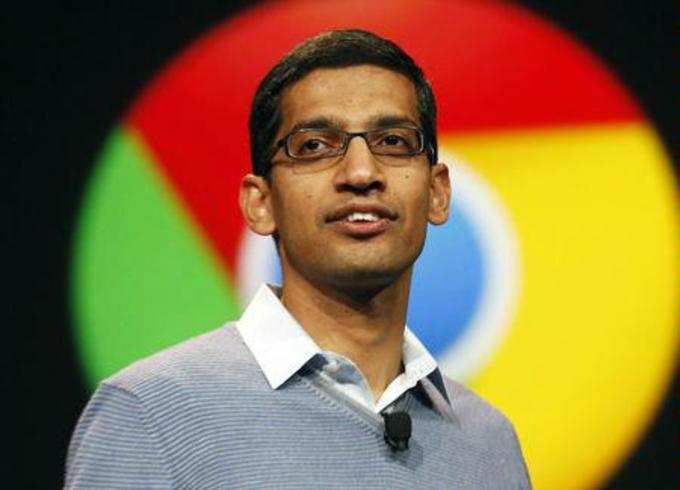 The ‘most powerful man in mobile’ wears his stature lightly. Ask him how it feels to bear the title and he shrugs. “There are many powerful men and women in mobile. I’m fortunate to be part of that group. But by no means do I think I’m the most powerful person.”
The ‘most powerful man in mobile’ wears his stature lightly. Ask him how it feels to bear the title and he shrugs. “There are many powerful men and women in mobile. I’m fortunate to be part of that group. But by no means do I think I’m the most powerful person.”At 42, the tall, slight and soft-spoken
Pichai confesses to not knowing too much about Google's operations in India, though he adds, “I follow India news on the TOI website every day.”
Asked if he's aware that he has become a household name in India, he says, “I’m humbled to be in this position of responsibility ... When I come to India, I do feel some of that sentiment and appreciate it. I’m nostalgic but also very excited. India has always had potential but it’s now moving to have a big impact. The trends will only go in one direction from here. What strikes me every single time is that the aspirations of Indians are unique and unparalleled. They’re very demanding, regardless of background ... Entrepreneurs are beginning to work on unique things. There's a palpable sense of excitement that I'd never noticed before.”
The full interview:
You’ve become a household name for Indian families around the world. Has that made a difference to your life?
Yes and no. I do feel a strong sense of support and backing, though I don’t always necessarily know all these people. I’m humbled to be in this position of responsibility where I can do stuff that I feel passionate about, and which can impact so many lives. It’s a privilege I cherish. But it hasn’t really affected my day-to-day life. I’m very busy in the same way I have been for years.
Still, when I come to India, I do feel some of that sentiment and appreciate it. I’m nostalgic but also very excited. India has always had potential but it’s now moving to have a big impact. The trends will only go in one direction from here. What strikes me every single time is that the aspirations of Indians are unique and unparalleled. They’re very demanding, regardless of background.
At Google, we feel that India will be the biggest source of growth for Android for years to come. The scale of what we can accomplish here is huge. Things like Android One (which aims at providing affordable smart phones) have been conceived with India in mind. We want to do it right here and then use that as a template to take it outside.
How does it feel to be described as the most powerful man in mobile?
There are many powerful men and women in mobile. I’m fortunate to be part of that group. By no means do I think I’m the most powerful person. But that article did make for good reading (laughs).
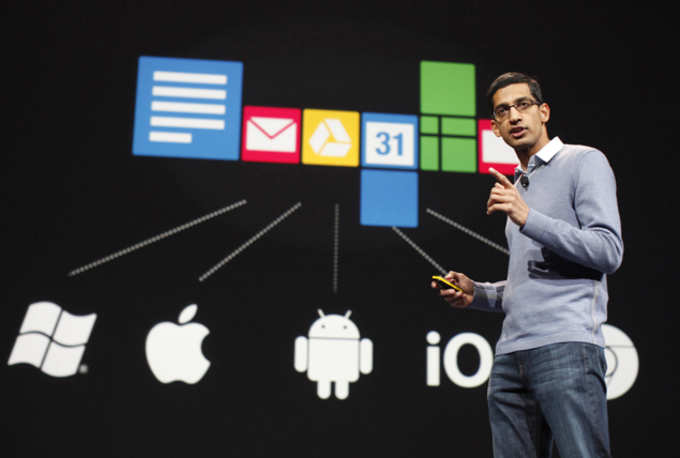
Sundar Pichai.
The Android ecosystem is almost Machiavellian. You have a powerful ally in Samsung, potentially a major rival. You have lots of other partners who compete with Samsung. Do you think this is sustainable long term?
Yes, it’s a complex ecosystem but we have a pretty simple, neutral agenda. We run Android in a very open way and work closely with all partners. We work with Samsung and I spend a lot of time with them. But we’ve always supported other partners. Of course, things evolve within an ecosystem, and sometimes people can start seeing patterns and agendas that may not really exist. But we don’t strategize, favouring one player over another. So, it’s not really an issue for me.
One reason you’re supposed to have been put in charge of Android is because of your diplomatic skills. They must come in handy in this complex environment?
We’ve always taken a long-term view. I believe that partnerships matter. And, all our partners are trying to do the right thing in general. I believe most people try to act out of good intentions. And I genuinely believe in Android’s open platform. That helps.
If you were asked to rate Samsung, Apple, Microsoft, Facebook and
Samsung is a valued partner with whom we work closely. The others are all very successful companies with long-term views – a lot like Google. But where we go with Android will have very little to do with what others are doing. Take Android One. We’re not worrying about others. We’re charting our own course. I don’t wake up every morning and ask, ‘What are others doing?’ It’s tough to work that way. Of course, we do overlap in certain markets. We’ll compete with these companies in many areas. We’ll partner with them in areas that may not be immediately obvious. I hope Microsoft will do Office with Android. We’re excited by the success of WhatsApp on top of Android. Amazon brings services like Kindle on top of Android. It’s a coopetitive world and a lot more complex than people realize. When you run a platform on scale, you have to make sure it’s truly open. That way, not only do you do well, so do others.
How are Google products doing in India?
In Android, we’re roughly tripling our user base every year. In core products and services like search, maps, Chrome,
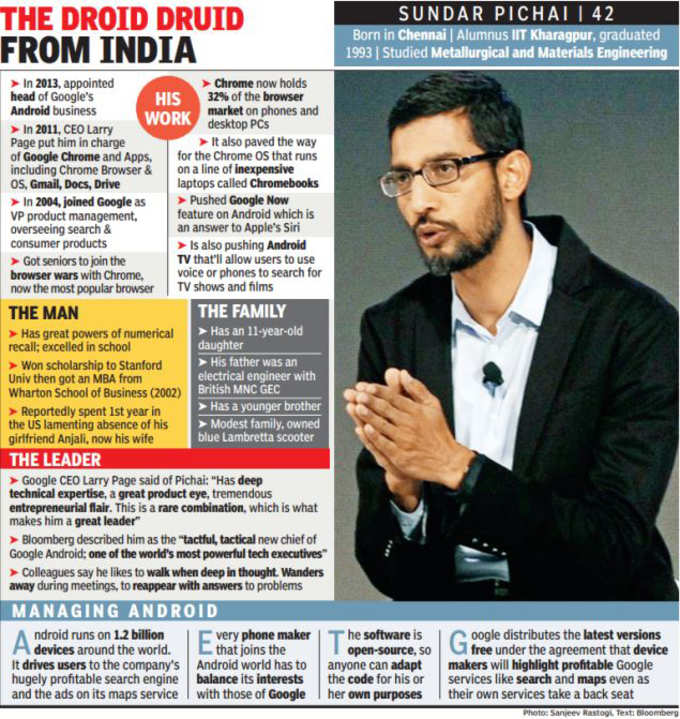
There have been controversies about Street View?
I’m not fully familiar with the situation but I’m a fan of the product. I hope we can work through the issues with the authorities in a responsible and sensitive way. In some other countries where there were most controversies, the product turned out to be extremely popular after launch. I’m optimistic the same will happen in India.
Will Google’s self-driving car be able to handle Indian roads?
That’s such a good question (laughs). When we work on 10 X projects, we do it knowing that regardless of where they end up, they’ll be impactful because we’re aiming at doing something transformational. I don’t know if the car will be able to survive Indian roads on Day One but the technology will still be exceptionally important, because the combination of hardware and software that we’re using will really evolve state-of-the-art driving.
How soon do you expect to see it on American roads?
Google teams have lots of autonomy, including from people like me. But the cars are making rapid progress. I take a drive in them every few months and each time I’m surprised at how much progress they’re making. I hope we get to see them soon. The challenge is to arrive at an end-to-end value proposition that works for people. It’s like an electric car. You have to arrive at a context where they work for people as a consumer product.
Among the portfolio of products you handle, which will be the most impactful?
I think the computing platforms we work on ie the combination of Android and Chrome, will touch lives on an unprecedented scale. We probably have 1.6 billion-1.7 billion PC users after 40 years and Android will get there in less than 10 years. The impact of giving someone a connected smartphone is no different from giving them a real computer. I look at how my kids learn and how different it is from how I learned because the impact of these things is just so huge. Sometimes I think we don’t fully internalize what it is to get the power of knowledge in everyone’s hand. It’s a levelling of the playing field on a scale that’s never been done. Rather than a product, I think what will have the most profound impact is this journey of getting computing in everyone’s hands.
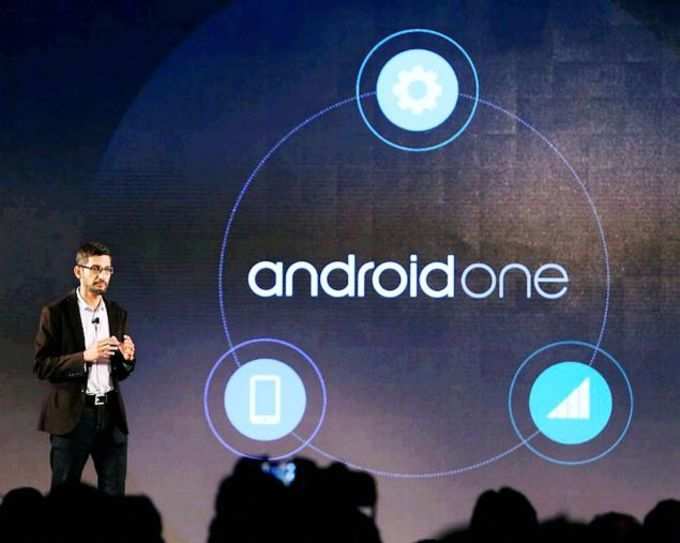
Sundar Pichai at Android One Launch in New Delhi on September 15, 2014. (PTI photo)
Quite literally in some cases, like the smartwatch you’re wearing.
This? (gestures at wrist). This one is unreleased and very confidential. Sorry, can’t talk about it.
What’s your take on wearables?
We’re still in the early days. Certainly, it will take us in interesting directions in health and fitness. Most of us have very limited health information. We get it once a year or once every two years visiting a doctor. But the human body doesn’t work that way. It’s a dynamic system. The other thing is, today you still have to do a lot to make computing work for you. But wearables will force us in a direction where they’ll do the hard work and give you the right suggestions at the right time, assisting you in more meaningful ways. By the time we’re done with wearables, computing will have evolved in a pretty significant way. Wearables will first focus on arriving at the right value and only after that phase will we start looking at costs. But Android is geared to drive that process at scale. Hopefully, as with phones, we’ll soon see a situation where you will have all kinds of wearables at different points of the price range, from entry level to high end.
Can you give us an update on Android TV?
We’re seeing lots of interest in it. Lots of original equipment manufacturers will ship sets with Android TV next year. You should see traction in India after that. I expect 2015 to have solutions based on Android TV for India. We’re working with OEMs here too, though it’s still at an early stage. Of course, India is a unique market. Solutions will only work if people internalize the market and develop for it. Android will allow you to do that. It’s set up in such a way that someone can work on top of it to serve a local market well.
To give you an example from mobiles, I didn’t ever understand the need for dual SIM but someone else did and used Android with it. I was playing around with Ixigo as an app. I remember standing for hours to buy train tickets and it was only when you got to the counter that you even knew if you were going to get a ticket. Today, I look at how Ixigo makes the process so much easier. I don’t think anyone will be sitting in Mountain View (Google’s headquarters) thinking, ‘Hey, what can we do to help get better train schedules to people in India’. But somebody who does understand it can use Android to make a difference here. With live TV integration, somebody can create a very immersive experience. You can walk in front of your TV and say the name of a programme and it’ll play it for you. Since the structure of the TV market here is different from a mature market like the US, somebody can drive that innovation at a faster pace and make something on top of Android TV which will not be possible elsewhere.
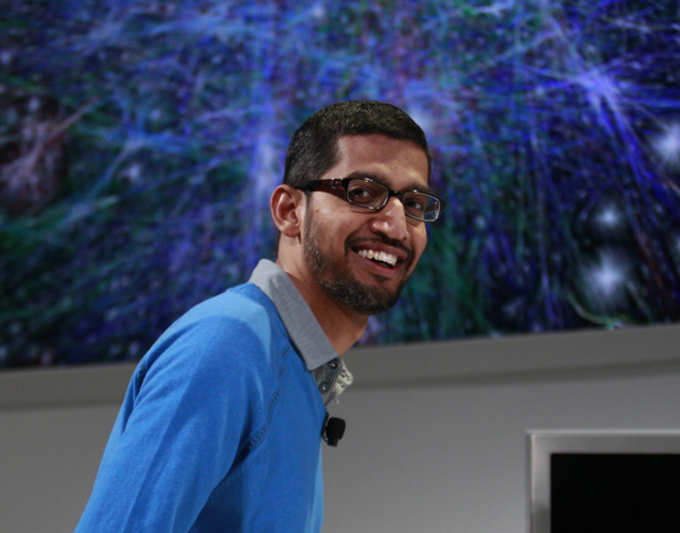
Sundar Pichai.
How are so many Indians making a mark in Google and Silicon Valley?
Somebody was helping pull out the car in a hotel here and he told me he’d seen a speech of mine and found it very motivating. The value that Indians place on education and the interest in learning about technology, regardless of status, is probably an attribute that has contributed a lot to the Indian story.
What do you think about the entrepreneurial set-up in India?
People are beginning to work on things that are unique. Historically, start-up environments fare well when great entrepreneurs have access to capital and the confidence to take risks. I’m beginning to see that in India. The advantage that entrepreneurs have here is the size of the domestic market. If you’re in a small country with a population of 3 million, you have no choice but to think global from the start. But in India, you can start with focusing on the domestic market and expand abroad, which is how China has worked for a while. I don’t have an eye into the future. But I do sense excitement which feels different from the other times I was here.
There were rumours that you were a contender to be Microsoft’s CEO before Satya Nadella got the job …
I can’t comment on rumours (laughs). I’m committed to what I’m doing. I’m passionate about computing. It’s been a meaningful journey and that’s what drives what I do.
Do you dream of being Google’s CEO one day?